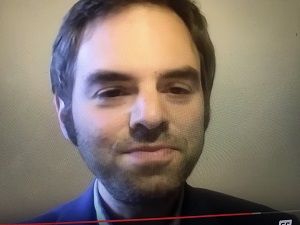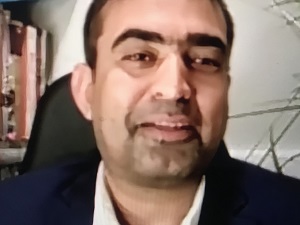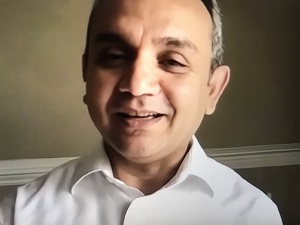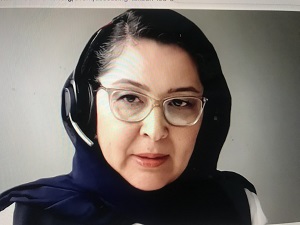Wilson Center Panel Reviews Life in Taliban-led Afghanistan
By Elaine Pasquini


Michael Kugelman |

Mirwais Balkhi |

Nader Nadery |

Suraya Dalil |
Washington: Assessing Taliban-led Afghanistan two years after the fall of the Western-supported government of Afghan President Ashraf Ghani was the subject of an August 15 webinar hosted by the Wilson Center’s South Asia Institute, moderated by its director Michael Kugelman.
“It’s a sad day to remember two years on,” lamented Wilson Center senior fellow Nader Nadery, a participant from the Afghan government in the Doha talks with the Taliban in 2020 and 2021, former senior advisor to President Ghani and former Afghan human rights commissioner. The Taliban, he said, is an “archaic government” that only offers a limited – if any – role for its citizens in decision-making processes.
Providing services to the population is not considered the prime obligation of the Taliban, Nadery explained, but “obeying the orders of the authority…is considered a prime obligation.” While there is no delivery of services on health or education, the population is expected “not to raise their voices. They do not have the right to gather, the right to freedom of assembly and the rest of the rights in the constitution that Afghans have had since1990,” he said. “For over a century, Afghans have been practicing these – all of which have been abolished.”
Afghan women are rightly calling for “recognition of gender apartheid under international law,” he continued. “The majority of the Afghan population are demanding access to education… for the girls. It is purely for the political reason, not religious reasons, that the Taliban are adding to their level of suppression.”
Nadery does not see any indicators among the policymaking circles of the Taliban leadership that would give him hope that there will be a change of course. At the same time, the dilemma of the international communities will continue if the economy starts to see signs of a decline. “Once the economy shrinks, the stability that some people predict…is going to be affected in the next year,” he warned.
Afghans, he emphasized, need to empower their own voices and create a unifying position. “It’s our country; we have to do things that change the situation and the life of our own people,” he insisted. “We owe it to the 40 million who are left in misery today because of some of the wrong policies and decisions we made when we were in the government.”
Dr Suraya Dalil, former Afghan minister of public health and former Afghan ambassador to the UN, called the past two years “dark and disappointing,” not only with regard to the public healthcare sector, but overall. Until two years ago, one-fifth of healthcare providers were female, she pointed out. The last 20 years, investment in girls’ education, jobs and overall development really enhanced girls’ education and women’s employment and particularly in the health sector, which traditionally has been attractive to women in Afghanistan for decades.
Unfortunately, two years ago many educated people left the country causing a healthcare workforce shortage and now the Taliban is not providing regular salaries or continued training. “When there are no job prospects or career development opportunities, there is the tendency for healthcare providers and professionals to be less encouraged and to think of other options and pathways including migration,” she said.
In addition to the deteriorating economic situation, Afghanistan is suffering natural disasters as well as overall food insecurity and “the elements that could direct us to see a more positive picture are not there,” she noted. “I think the level of vulnerability for millions of Afghans has increased tremendously and that justifies an honest, truthful debate and discussion among ourselves, thinking of self-reliance and self-dependency…and see what went wrong and how this can be prevented in the future.”
The US, Dalil said, needs to distinguish between its foreign policy and military interest versus human rights principles. Afghanistan is experiencing the consequences of a US foreign policy that prioritized military interests over human rights principles, she argued.
Answering Kugelman’s question on what could be done going forward, Dalil responded that we need to listen to women and men in Afghanistan and engage with them. “The grassroots movement for freedom in Afghanistan must genuinely be acknowledged, supported and empowered.”
Former Afghan minister of education Mirwais Balkhi, now a Wilson Center fellow, defined the Taliban as an “ideological, armed radical group with a tribal background.” Ideologically it is an objective of the Taliban not to allow any educational opportunity to the women and girls of Afghanistan.
Balkhi is also concerned because, even for boys, the Taliban are trying to include certain ideological lessons and thoughts in the curriculum. With new teachers coming from a madrasah background, he questioned how an instructor could teach mathematics, physics or chemistry. Because of this, he pointed out, Afghans who have the financial ability migrate to Pakistan or Iran for their children’s education.
Regarding security, the Taliban’s claim that IS-K is weakened in Afghanistan is not reflected on the ground, he said, citing ongoing suicide bombings, rocket launches, kidnappings and assassinations. And he has not seen any positive signs that the situation in either the education or security sectors will improve in the future.
Despite this, “the US and international community cannot disengage from Afghanistan because Afghanistan is a reality and its 40 million people are a reality in that part of the world, and, if they are in catastrophic danger, it affects everywhere else,” Balkhi said.
In conclusion, the three panelists – all former members of the Ghani government – expressed regret that they had left Afghanistan.
“I wish the masses of intellectuals had not left the country two years ago, including myself,” Dalil stated. “I think the biggest vacuum that has been created is the loss of educated people…who left the country in many walks of life, in many disciplines, in different areas of work. I wish that had not happened and we would have remained a massive force inside the country to confront this from within.”
(Elaine Pasquini is a freelance journalist. Her reports appear in the Washington Report on Middle East Affairs and Nuze.Ink.)

